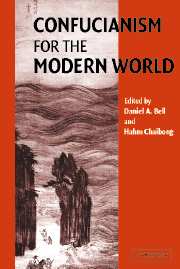Book contents
Epilogue: Why Confucius Now?
Published online by Cambridge University Press: 28 August 2009
Summary
The question, simple enough in itself, naturally breaks into two parts: “Why Confucius?” and “Why Now?” In other words “Why Confucius, the person and the man (rather than Confucianism), and why especially now?” The first part focuses on Confucius himself, whether as a person or as a mythic figure. The second part raises as many questions about our present condition, and its needs, as it does about the past.
I shall defer for the moment these latter questions in order to deal first with this one: Can our present problems be dealt with simply by invoking the teachings of the “original” Confucius? Must not their relevance to our contemporary situation take into account, in some way and to some degree, what they have meant to Confucians historically (i.e., as Confucian tradition or what we call Confucianism, which could also include the Japanese and Korean experience as well as the Chinese). Many twentieth century scholars have tried to identify the “original Confucius” or interpret the “Original Analects,” and any number before them in China, Japan, and Korea have tried to do the same. As just one example, ItōJinsai and other seventeenth- and eighteenth-century Japanese scholars identified with the “Ancient Learning” movement attempted to peel off the layers of historical commentary and philosophical reinterpretation in order to get at the original “meaning” of Confucius. Scholars in Qing China did the same.
- Type
- Chapter
- Information
- Confucianism for the Modern World , pp. 361 - 372Publisher: Cambridge University PressPrint publication year: 2003
- 5
- Cited by



